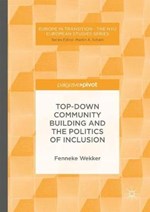Top-down Community Building and the Politics of Inclusion
24 september 2018Join us for the launch of Fenneke Wekker's new book at our store on the Roetersstraat on the 24th of September, from 17.00 - 19.00. The book Top-down Community Building and the Politics of Inclusion by Fenneke Wekker explores mechanisms of inclusion and exclusion involved in practices of community building through an ethnographic study of a neighborhood restaurant in Amsterdam. Author Fenneke Wekker will present the book, followed by two responses from Halleh Ghorashi and Justus Uitermark.
The book puts forward important insights into the advantages and empowering effects of professional, top down community building in a disadvantaged neighborhood, as well as its tensions and contradictory outcomes.
The core argument of the study is that, in spite of the observed restaurant's well-intended and well-organized attempts to create an inclusive and heterogeneous local community, it instead established one both exclusive and homogeneous. Through a set of community building- and discursive practices, the construction of collective fear for ethnic and racial “others" was indirectly facilitated among the white, working class visitors. As a result, insurmountable barriers were erected for non-white and non-native Dutch residents to become part of the local community.
This project speaks to social scientists as well as social workers, governments, and policy-makers concerned with issues of social cohesion, informal networks, and professional community building in disadvantaged urban settings.
About the speakers
Fenneke Wekker studied Sociology at the University of Amsterdam, and finished her Research master Social Sciences cum laude. Her book Top-down Community Building and the Politics of Inclusion is based on her master-thesis. Currently, she is in the final year of her PhD-trajectory in Political Sociology. Her research focuses on social interventions in heterogeneous urban settings, that aim to build local communities and increase feelings of home and belonging.
Halleh Ghorashi is Full Professor of Diversity and Integration and Head of the department of Sociology at the Vrije Universiteit Amsterdam. Between 2005 and 2012 she held the prestigious position of PaVEM-chair in Management of Diversity and Integration at the Department of Organization Science at the VU. Ghorashi's research focuses on issues such as diasporic positioning, refugee's narratives, cultural diversity, emancipation and inclusion with the particular focus on power dynamics in society and organizations.
Justus Uitermark is Associate Professor of Sociology at the University of Amsterdam. Uitermark studied Human Geography at the UvA and received his doctoral degree in Sociology and Political Sciences for his PhD-thesis ‘Dynamics of Power in Dutch Integration Politics’.
Fatiha El-Hajjari (moderator) has a BA in Sociology and rMA social sciences (both UvA). Her main fields of research interests are citizenship, social policy and social care, gender and feminism, integration, and the politics of Islam and Muslim identities. In previous projects she studied how mainstream discourses on active citizenship erase the civic activism of Muslim women in the Netherlands.



